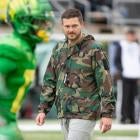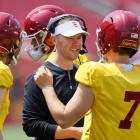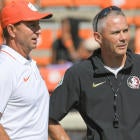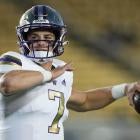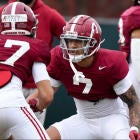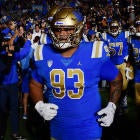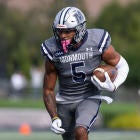
The NCAA Division I Council voted Monday to delay enacting legislation on two major fronts: name, image and likeness rights and a one-time transfer exemption that would allow athletes to switch schools once without sitting out a year in residence, sources confirmed to CBS Sports.
CBS Sports reported over the weekend that both pieces of legislation, which were once expected to be passed, would instead be delayed indefinitely.
Name, image and likeness legislation had been expected for months to pass this week. However, in light of a letter sent from the Justice Department to NCAA president Mark Emmert on Friday, and due to a high-profile NCAA case expected to be heard later this year by the Supreme Court, the council opted not to push forth the legislation for a vote later this week by the NCAA's Board of Directors.
The transfer legislation would have allowed first-time transfers across all NCAA sports immediate eligibility. Last fall, the NCAA approved the measures for a vote at this week's NCAA convention, but because the transfer initiative is seen as something inherently tied to name, image and likeness benefits, it too has been pushed back. The Justice Department's letter also referenced the transfer issue.
"We believe, as courts have regularly held, that our current amateurism and other rules are indeed fully compliant [with federal antitrust law]," Emmert wrote in a response letter to the Justice Department obtained by the New York Times. "Whenever we consider revisions to the rules, however, we of course receive input from many interested parties, and we welcome your invitation to consult with the department so that we can hear and fully understand its views as well."
There is no timetable as to when the NCAA Council will opt to bring these issues back up for discussion and approval, but sources indicated to CBS Sports that the goal is to enact this legislation in 2021. The Supreme Court's hearing of Alston v. NCAA is expected to happen by the late spring or early summer, according to CBS Sports' Dennis Dodd. Looming legislation at the federal level tied to college athlete benefits could drastically impact the NCAA's model on amateurism if the federal government allows college players to gain rights well beyond anything the NCAA has allowed since its inception in 1906.
"There's been a lot of rumblings behind the scenes that the NCAA shouldn't do anything on NIL until the Supreme Court rules," one league commissioner told CBS Sports last week. "The thinking being: Why would we go out and set policies and procedures when the Supreme Court hasn't ruled on [the case]? Let's hear what they determine and develop policies based on how they rule."
The NCAA has been working on this legislation for more than two years. Depending how its huge case is handled in the highest court in the United States -- and pending the details of any federal bills tied to college athletes' rights to make money while in school -- the NCAA might have to significantly alter its own regulations on this topic later this year.













